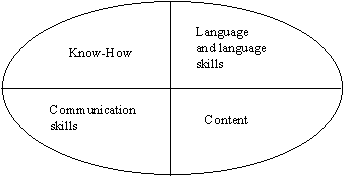
N. F. Medvedeva
Associate Professor
Moscow State University
Business English has well established itself in Russia. Its popularity among the learners of English the same as the interest of EFL teachers to it have been constantly growing and seem to be still on the rise. For these reasons specialists dealing with various matters of Business English in Russia: research, materials development or teaching should learn to speak common language.
In what follows I would like to look at those essentials of Business English which are to be the core part of BE teacher’s know-how.
BE or EBP /English for business purposes/ belongs to the ESP domain. The following chart /Richard West- University of Manchester/ establishes it as a member standing between English for Academic Purposes and English for Science and Technology:
EAP – English for Academic Purposes
EBP – English for Business Purposes
EST – English for Science &Technology
Generally the division under consideration seems well grounded when the problem is discussed within some one English speaking culture. But it might be puzzling for those whose native language is other than English and who belong to a different culture.
The most obvious difference between EBP and both framing the chart members is the inderlying principle. In case of EAP and EST it is language and language skills, while in case of EBP it is communication effectiveness. The latter is built upon language skills but involves communication skills, problem solving skills, cultural awareness.
That is why a Russian EFL teacher who bases his own BE course on the idea that EBP is one of ESP-s will naturally see language accuracy and communicative fluency as final targets, and will make a mistake, as these are not final in business English teaching.
What he/she will have to deal with besides traditional languge teaching is studying the rules of situational behaviour in various registers: meetings, negotiations, telephoning, presentations, etc. and the related language gambits. Besides he/she will have to study cross-cultural factors, which are capable of impeding effective communication. That is important because, on the one hand his/her students are foreign speakers of English and thus should possess cultural awareness in terms of the opposition English vs Russian culture. On the other hand, business English today is largely international.
It is clear that a BE teacher will have to acquire skills, the scope of which is somewhat wider than might seem on the surface.
To the Adrian Pilbeam’s (LTS Training and Consulting, UK) list of skills or characteristics of the «good» business English teacher, which reads as follows:
knowledge of the business world
experience of working in business
knowledge of language and linguistics
outgoing personality
ability to identify learner needs
ability to plan a course
good TEFL experience and skills
flexibility
creativity
good organisation skills
smart appearance
I would add “knowledge of business communication culture,” including:
knowledge of native English speaking culture
knowledge of international speaking culture
knowledge of Russian speaking culture.
Knowledge of business communication culture will help a Russian learner of business English to see better what is meant by communication effectiveness and how to be communicatively effective in real context of international business interaction.
Apart from sophisticated skills described above a BE English teacher should be able to analyse training needs and set training objectives decide on course content and a course plan select and exploit appropriate published and authentic material teach business communication skills e.g. presentations use role-plays, simulations and other activities evaluate performance with tests and exams
To sum up -Teaching Business English requires professionalism which is the sum total of:

Communication skills
1) inventory;
2) choice and purpose;
3) structure and stages;
4) models and techniques;
5) performance.
Know-How
1) types of text-books and the problem of choice;
2) types of discourse (text, audio, video and balance);
3) methodology
individual vs group work (analysis, discussion, case-study, simulation,
role-play, project work);
4) course planning and course design;
5) testing and evaluation.
Language and language skills
a) choice
b) drill
c) control
Vocabulary (terms vs words of general language)
Grammar (basic vs specific)
Functions (specific for particular skills).
Content
1) selecting topics;
2) setting goals;
3) structuring discourse (text, audio, video);
4) choosing method(s);
5) revising, consolidating, diversifying.